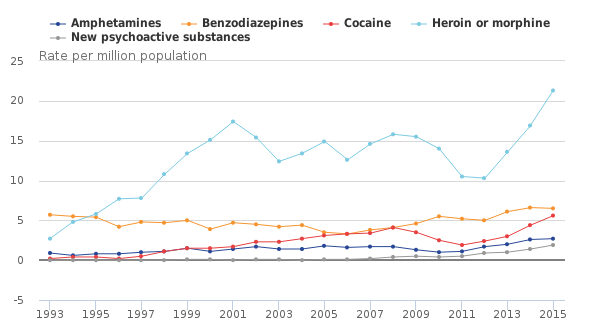New figures published last Friday by the Office for National Statistics shows that deaths related to drug misuse have risen to record levels, reaching 43.8 deaths per million in England and Wales in 2015. The increase is driven in part by increasing purity and availability of heroin, which has led deaths involving heroin and morphine to double since 2002.
Behind these numbers are individuals whose lives have been cut short. Deaths from drug misuse are avoidable, and it is vital that we learn from the evidence and work together to prevent them.

(Source: ONS)
In light of this, MEAM welcomes the timely publication of a new report on understanding and preventing drug related deaths in England. It reflects the findings of an expert working group convened by Public Health England, to which we were glad to contribute evidence.
The report highlights the fact that “people who move between services for drug treatment, mental health, housing support or physical health, and have the most complex needs, are at significant risk of drug-related deaths.” We know this group includes people in contact with the criminal justice system.
It sets out a number of principles for action. These include maintaining the provision of drug treatment and effective harm reduction, and widening the provision of naloxone, a drug which can prevent death from overdose.
We particularly welcome the key recommendation that we should meet complex needs through coordinated, whole-system approaches and aligned commissioning. This recommendation is consistent with wider evidence on what makes for effective support for people experiencing multiple needs.
The report highlights the importance of supportive physical healthcare and psychiatric care. It also reflects the significance of key transition points within the criminal justice system, noting that the risk of someone dying in the first four weeks after leaving prison is significantly lower if someone is receiving opioid substitution treatment.
We endorse the report’s call for further research on the links between drug-related deaths and wider factors such domestic abuse, hospital admissions and successful completion of drug treatment. This is a key element of ensuring providers across all sectors can act early, effectively and together to save lives.
